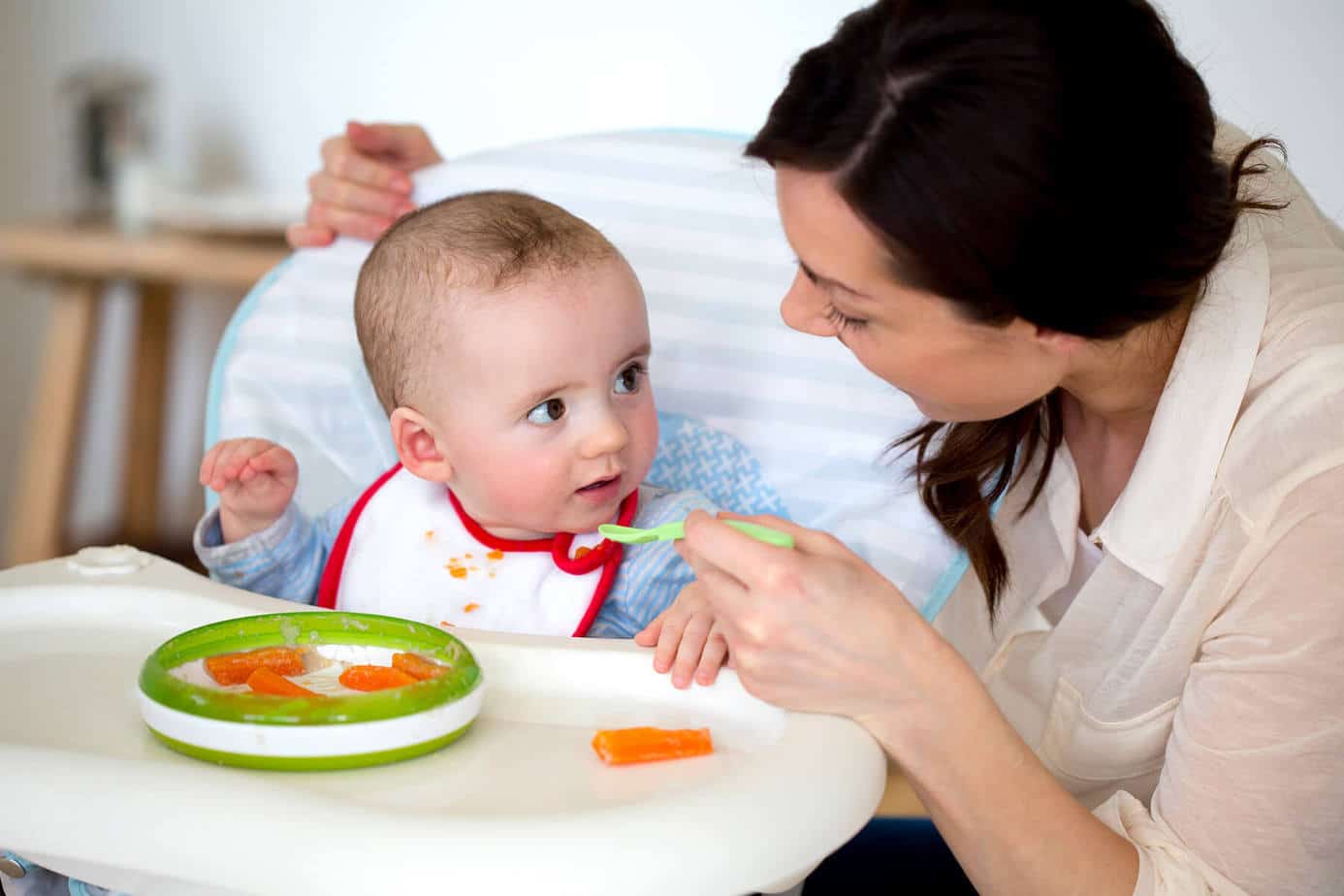Nutrition – Vitamins and Minerals

When it’s time to start introducing your baby to solid foods it’s important to know which foods contain the essential vitamins and minerals they need for healthy growth and development.
Introducing solid foods at around 6 months of age (also known as weaning), is important as it’s a time when your baby is beginning to need more nutrients and energy than breast milk or infant formula alone can provide. Offering your baby a wide range of foods from the recommended five food groups (vegetables, fruits, breads and cereals, meats and alternatives, and dairy and alternatives) is the best way of ensuring they get the vital nutrients – including the essential vitamins and minerals – they need.
Vitamins and minerals (also known as micronutrients) play an important role in how babies develop and function – without them many of the thousands of chemical reactions inside their bodies would not occur. Only very small quantities are needed and our bodies are ‘designed’ to absorb most of the them from food.
It’s important to remember that breast milk or infant formula should still remain an important source of nutrients throughout your baby’s first year.
For more information on the five food groups see our Weaning Food Groups article
For more information on macronutrients see our Weaning Nutrition – Macronutrients article
Vitamins
Healthy growth and development needs a range of different vitamins – including A, B-group, C, D, E and K:
Vitamin A is an important vitamin that is needed for healthy eyes and skin, and a well-functioning immune system. Good sources of vitamin A include eggs, yoghurt, liver, and leafy green, orange and yellow vegetables.
B-group vitamins are involved in a range of different roles, such as helping to release energy from our food, making new red blood cells or keeping our nervous, digestive and other systems healthy and functioning properly.
The B group of vitamins includes:
- Vitamin B1 (thiamin) – which is needed for a heathy heart, digestive and nervous system as well as in the conversion of carbohydrates to energy. Good sources of vitamin B1 include wholemeal bread, yeast extract, oats, fortified breakfast cereals, fish and pork.
- Vitamin B2 (riboflavin) – is important for tissue growth and repair. It is found in milk, leafy green vegetables, meat, and fortified breads and breakfast cereals.
- Folate – is needed to make new red blood cells and keep the nervous system healthy. Folate rich foods include liver, legumes, green leafy vegetables, oranges, bread and fortified breakfast cereals.
- Vitamin B12 – is vital in the production of new red blood and nerve cells, and the processing of fats and carbohydrates. It is found in foods such as meat, fish, poultry, eggs and dairy products.
Vitamin C helps the body fight infections, absorb iron as well as being important in the digestion of proteins. All fruit and vegetables contain vitamin C, but some fruits such as oranges and kiwifruit, and vegetables from the cabbage family (e.g. broccoli) are particularly rich in vitamin C.
Vitamin D is needed for the body to absorb calcium to make healthy, strong bones and teeth. We can make vitamin D when our skin is exposed to sunlight – but some foods such as fortified milk and margarine, eggs and fish (e.g. herrings and salmon) also contain vitamin D.
For more on the importance of Vitamin D, see our Vitamin D Deficiency article
Vitamin E is an antioxidant that helps keep cells healthy and is found in foods such as leafy green vegetables, egg yolks and sunflower oil.
Vitamin K is important because it helps to clot blood. It is found in leafy green vegetables and milk.
Minerals
Did you know that about 4% of your bodyweight is made up of minerals such as iron, calcium and zinc?
Iron is a vital mineral that needs to be included in your baby’s diet from around 6 months when their own stores are beginning to fall. Iron is required for red blood cells to function properly and helps transport oxygen around the body. Red meat, chicken, green vegetables, eggs and fortified breakfast cereals are good sources of iron.
For more on the importance of iron, see our Iron Deficiency article
Calcium is essential for the development of strong bones and teeth, and how well our muscles and nerves work. Some of the best sources of calcium include dairy foods such as milk, cheese and yoghurt.
Zinc is important for a well-functioning immune system and helps with cell growth and wound healing. Zinc can be found in seafood, poultry, meat, legumes and fortified breakfast cereals.
Most babies and toddlers will be able to get most of the vitamins and minerals they need from a healthy, well balanced diet. If you’re not sure about whether your baby is getting all of their essential nutrients, talk to your doctor, child health nurse or a dietitian.
or more information on foods suitable for your child at the different stages of weaning see our articles: Stage 1: From 6 Months – First Tastes, Stage 2: 7-9 Months, Stage 3: 10-12 Months and Stage 4: 10-12 Months
AF03917


